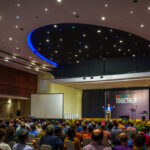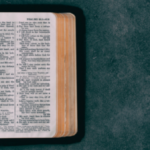Obey God’s Word
James 1:19–27
Each generation develops its own slang. A common term today is live loud. According to a popular modern culture dictionary, the phrase live loud means living purposefully, loving others passionately, shining your light and inspiring others to do the same. In other words, live loud means to live and act on what we know and believe. Christians live loud as we obey the truths of Scripture.
Respond to God’s Word with humility. (19–21)
A prerequisite to living loud is learning to listen. James challenges his readers first to understand. Being quick to listen precedes being slow to speak. The Greek term translated quick is “tach,” the term from which our word tachometer derives.
Listen fast and speak slow, James commanded. Speak after reflecting on what you will communicate to prevent anger. James is not attempting to give good relational advice; he commands believers to do three things — be quick to hear, slow to speak, and slow to anger. Anger does not bring about righteousness (right living).
What does bring about God’s righteousness? Ridding ourselves of moral filth and evil is a requirement of receiving the implanted word that saves our souls. James’ words define the concept of repentance.
Obey the commands of Scripture without delay. (22–25)
In ancient cultures, people read out loud rather than silently.
The cost of producing ancient manuscripts was costly; therefore, spaces were not placed between words. Reading God’s word without living out His word deceives the reader of God’s word.
James taught that reading God’s word out loud without living God’s word out loud is foolish. Being a hearer without being a doer is like a person looking at his face in the mirror without taking the time to correct his or her appearance.
James highlighted three verbs to describe the proper way to read God’s word. Persevere in the Word, that is, continue in the Word. Do the Word. Reading God’s word is important, yet James claims that doing the Word is more important. Allow the Word to judge your life.
Receive the Word. Hear the Word. Obey (be doers of) the Word.
Our faith is worthless if our words and actions do not line up. (26–27)
James has discussed “hearing the Word.” Now he shifts to “doing the Word.” James provides a contrast between two types of religion. One person thinks he is religious because he is faithful to religious worship services and activities.
Religion in the sense of religious activities may be self-deceptive, James argued. Religion that is limited to religious activities is useless or worthless according to James.
True, faithful, godly religion meets two tests: looking after people in distress and keeping oneself unstained from the world.
By Mark Rathel
Professor at the Baptist College of Florida in Graceville, Florida






